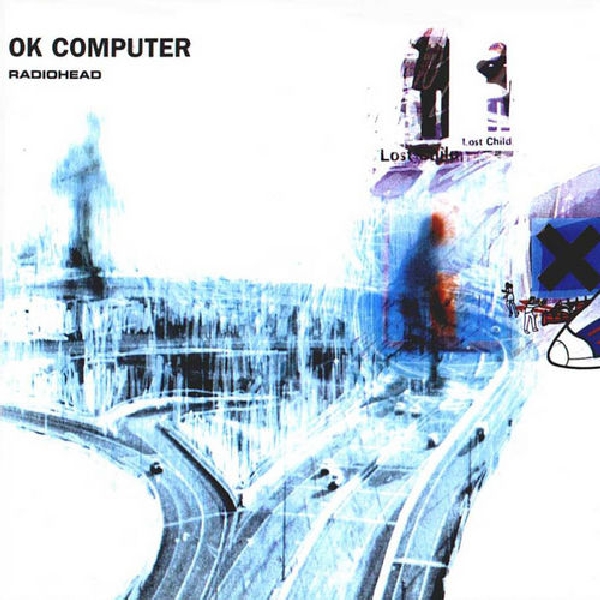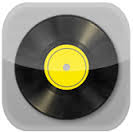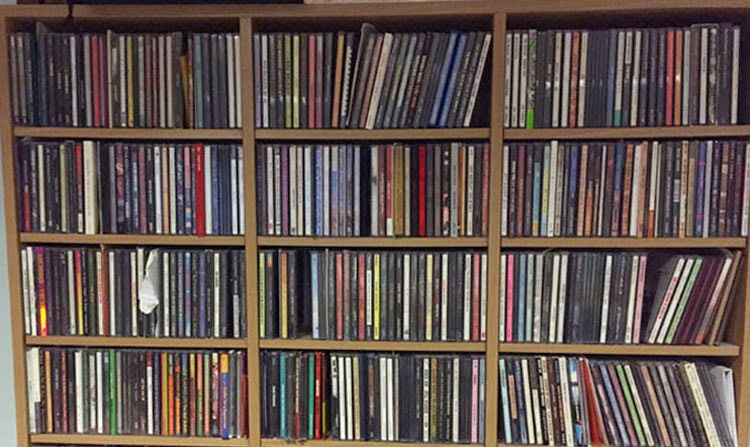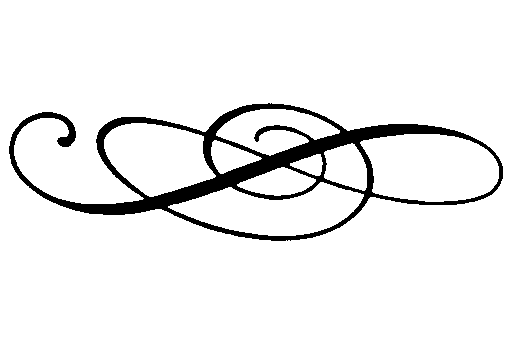

 Radiohead
Radiohead | Release date | Label | Producer | Genre | Length | More info |
| 1997.06.16 | Parlophone | Nigel Godrich | Modern Art Rock | 53:21 |    |
Hopelessly lost in a strange new world... and lovin' it?
Background
The basic image, style, musical philosophy of Radiohead were already well established prior to the release of OK Computer: Pablo Honey (1993) presented them as a new band soldily rooted in the grunge / alt-rock paradigm, but even on that album, conventionally thick, distorted, heavy guitars were sharply contrasting with Thom Yorke's vulnerably sentimental lyricism. The Bends (1995) saw them reaching maturity and relative stylistic independence, as the alt-rock idiom was completely subjugated to the band's own vision (and the tunes were more memorable, too). Already they were beginning to acquire a solid critical reputation as a more heavily intellectual, more ambitious, more experimental alternative to the dominant Britpop scene - however, their popularity outside of the UK (or Europe, at least) remained limited, and after the 1993 success of ʽCreepʼ (probably revered due to its grungy sound), they had not yet been able to return to the big commercial league in the US. Nevertheless, the second half of the 1990s was pretty much the perfect time to reintroduce ambition, depth, and complexity into commercial pop music (after grunge and Britpop had cleared the path in the first half of the decade), so, in a way, the world was ready for some new reincarnation of Shakespearian tragedy in a pop album format.
Some basic facts
Although OK Computer is nearly always spoken of as a "concept album", with "survival in the modern world" as a basic theme, it was not specifically intended as such; the songs were written over a long time stretch (for instance, ʽLuckyʼ dates back to 1995, when they recorded it for a special charity album at the request of Brian Eno), cover a variety of issues and display all sorts of influences. The only objectively conceptual thing about it all is the band's burning desire to experiment and innovate. The album's noted influences stretch all the way from DJ Shadow to Krzysztof Penderecki, making OK Computer a true connoisseur's delight, and its twisted arrangements and overdubs, unusual chord changes, and lyrical cross-references have all been analysed in countless reviews and musicological analyses. Any "conceptuality" beyond that probably remains unintentional - including Yorke's lyrics, which regularly explore topics of alienation, isolation, desperation, frustration, and other negatively tinged -ations, in the face of a large, hard-to-understand, ridiculously insecure and complicated universe; but this merely reflects how he was feeling at the time, and is a rather natural lyrical pathway for anybody who does not wish to be limited to songs about personal relationships.
It is interesting that the first wave of critical praise often employed the term "progressive", even going as far as to state that Radiohead had done the impossible by reinstating the honor of "progressive rock", buried twenty years before under the rubble of the punk/New Wave explosion. On one hand, this is a ridiculous misunderstanding: OK Computer has very little in common with Yes or Genesis, since its songs are relatively short (only ʽParanoid Androidʼ goes over six minutes and consists of several different sections), relatively free of true instrumental virtuosity, do not take after Bach or Stravinsky, and essentially agree with the "pop" formula. Johnny Greenwood, the musical backbone of the band, inherits his art from Lou Reed and Michael Karoli rather than Robert Fripp; and as dazzlingly complex as the band's arrangements may be, they hardly outmatch The Cure in their ability to harmonize a miriad of sound channels. But on the other hand, it is curious that the notion actually managed to spring up - it indicates that OK Computer was perceived by many as a record that successfully re-elevated contemporary pop music to impressive artistic heights that it had never been able to properly recapture since the days of the Beatles and Pink Floyd. Unfortunately, it also set the predicament: from that time onwards, Radiohead themselves were elevated to such a lofty position that anything they'd be doing from then on had to match the admiration and respect for OK Computer - a killer chore even for a truly great band.
Upon release, the album was a strong, but not exceptional, seller (for a record that is routinely mentioned as the Greatest Album Of All Time, 5-6 million copies is not that much), with critical acceptance vastly overriding commercial performance; however, subsequent time seems not to have dulled its impact, and like it or not, OK Computer is going to stay emblematic of the late Nineties for quite some time. The expanded 2-CD reissue, released in 2009 largely without the band's knowledge, collects all the B-sides, some outtakes, remixes, and live performances, and will be of interest to the serious latecoming collector (because early coming collectors probably already owned all those tracks).
For the defense
The sound of OK Computer may be called "cluttered", but all the parts always fall together organically. ʽAirbagʼ begins with a powerful guitar riff that almost seems influenced by some classical solo cello suite, then transitions into a looped rhythm section with stop-and-start bass said to be inspired by the style of DJ Shadow (which they allegedly tried to copy but "failed"), while Yorke's singing style here inherits the old quasi-free-form expressivity of Tim Buckley, and it all somehow fits in: lyrically, the song celebrates life ("In the next world war... I am born again") while at the same time being frighteningly conscious of its incidental nature ("I'm amazed that I survived / An airbag saved my life"), and the deep dark bassline and the quasi-cello guitar riff are here to feed the fear, while the spaced-out high-pitched guitar trills dissipate it in favor of the unexplainable wonder of life. ʽParanoid Androidʼ alternates between one of the most expressive "weepfests" ever recorded (where vocals, guitars, and keyboards all join together in a light-hearted lamentation) and the loudest, angriest melody on the entire album - when Jonny hits hard at 2:42 into the song, this is the album's strongest link to Radiohead's past as an alt-rock band, but it is also a logical transition from one negative psychological state into another. And the gradual build-up on ʽExit Music (For A Film)ʼ (where the "Shakespearian tragedy heights" are taken literally, since the song was written as a musical representation of the Romeo and Juliet finale) is handled with meticulous psychological perfection - acoustic guitar first, back vocals next, then the special effects, then the rhythm section, then the screaming climax.
Those who have issues with a certain limpness and lifelessness of the Radiohead sound in the Kid A and posterior eras need not worry: with all its psychologism and pretension, OK Computer can still rock pretty hard, too, be it the crushing funky riff of ʽParanoid Androidʼ, or the droney, choppy, "trashy" playing on ʽElectioneeringʼ. Most of the time they don't want to rock pretty hard, but even then there is a strong rhythmic base that commands your attention - for instance, the metallic percussion sound on ʽClimbing Up The Wallsʼ which, together with the industrial synthesizers and Thom's lying-down-and-dying nasal falsetto, gives the song a sense of impending inescapable doom (Peter Gabriel used to like this shit). ʽKarma Policeʼ also has a strong, decisive stomp to it that somehow supports the idea of "this is what you get when you mess with us" (which, per se, is probably not the most convincing line to have ever left Yorke's lips). In short, each song has a strong personality, one way or another, and unless you have a strong aversion towards world-weary, depressed music as a whole, "boredom" as a basic reaction is probably excluded.
If I had to single out one favorite track, though, it would be ʽLuckyʼ - yes, ironically, the very first song written for the project when it was not even a project yet; and for one single, haunting reason - probably the single most haunting moment in Thom Yorke's entire career, as he pronounces the line "we are standing on the edge". Listen to him do it - have you noticed that the final consonant is left hanging in the air, as if they were really standing on the edge, abruptly cutting off into the abyss? Technically, the song was inspired either by the Bosnian conflict, or by the idea of surviving in an aircrash, or by both, but to me, it just sounds like the perfect ending to end all endings. I mean, "We are standing on the edge" - you could take this to mean literally anything. You could even think of OK Computer as the final dot, the culmination, the last breath after which there is really nothing left (and the critics agree - what other album after 1997 has managed to earn a similar reputation?). Or you could take it as a musical symbol of some political / economical / cultural apocalypse. The ferocious guitar solos are certainly quite apocalyptic, and the way they segue into the last of the "we are standing on the edge" bits... It might be a good thing that they preferred to end the record with the relatively harmless, sleepy, creepy-crawly ʽTouristʼ instead, a song about slowing down and catching your breath in a mad, mad, mad world, or else somebody would have accused them of propagating suicidal tendencies.
For the prosecution
Naturally, we are all entitled to feel or not to feel a spiritual connection to any work of art, and I usually feel a bit sad when finding myself unable to feel one for something that is so highly revered. At the very least, though, it deserves an attempt at an explanation. Why? What's wrong with OK Computer? Well, first and simplest of all, a big problem is Thom Yorke. By the time of Radiohead's third album, he had pretty much completed his transition from a "normal" singing style to a highly theatrical, "unnatural" one, consistently singing in a much higher range than he should be. This makes it seem as if the poor guy were stuck in a constant state of histrionic whining - and my senses cannot abide that. I am certainly no enemy to idiosyncratic "crazy" singing styles, but they all have their redeeming qualities. David Byrne, for instance, is just as hysterical, but he is being all humorous and tongue-in-cheek about it. Beth Gibbons sounds like she's ready to die from a broken heart at any minute, but she's totally convincing, and dying from a broken heart is a noble cause. Björk has this half-fairytale, half-childlike attitude that can be irritating, but can also be endearing. Yorke, on the other hand - every time he raises his voice above a certain pitch, he becomes a naggin' whiner to me, and I instinctively reach out for my big stick to drive the filthy beggar away from the house, maybe set the dogs on the sucker, too. Had he stayed more frequently in the quiet "we are standing on the edge..." mode, that'd be a different story. As it is, this is one singing style that I can theoretically respect - after all, he did polish it to perfection, and it's unmistakably his - but instinctively find alienating.
What is even more frustrating, though, is that I simply do not find enough strong melodies on OK Computer. The sound is fabulously great, but the actual musical themes... not really. A song like ʽLet Downʼ, for instance, simply has no discernible melody beyond all the pretty jangle, as far as I am concerned (unsurprisingly, the instrumental track sounds like a lost outtake from some Byrds session - another group with which I sometimes have similar problems). ʽKarma Policeʼ with its Neapolitan chord sounds like... well, any basic song with a Neapolitan chord, this one only redeemable through its vocal melody. ʽThe Touristʼ, as Greenwood later confessed, was a song specially written in a "lazy" mode, where something "doesn't have to happen every 3 seconds", but you know, I'd be perfectly happened if something happened there at all, because other than Yorke's frantic invocation for us to slow down (and the gorgeous-as-usual production), its melodic base is a fairly trivial piece of blues-waltz. Even for such a beauty as ʽSubterranean Homesick Alienʼ, all I usually remember is how those stars, clouds, and planets were all busy whistling past each other - I don't even remember how its vocals went, and vocal melodies are usually among the stronger hooks on this album.
I will not go as far as to say that OK Computer is a proverbial example of "style over substance". In a way, its style is its substance. The experimentation, the large bag of influences, the mixed atmosphere of fear, confusion, beauty, and awe, it's all there, and it's enough to make for an excellent listening experience. And critics, musicologists, cultural philosophers all over the world will doubtlessly go on having their field days, dissecting every second of the album as if it were the very embodiment of all the basic and advanced features of the human spirit. But if, just for one moment, we agree to switch to cut-the-crap mode, then I'd say that "the greatest album of the Nineties", not to mention "one of the greatest albums of all times", in my opinion, would need a little more meat over its bones before you start covering them up with skin. And a lead singer who would not find it too boring to sound, a little bit more often, like a normal human being.
Conclusion
I honestly wish - honestly! - that this record were not as universally revered as it is. To me at least, the hype hurts it without helping it - and it certainly hurts the band, who, from then on, could hardly count upon an honest critical review in the official press, since most critics would just be kissing their asses, no matter how progressively weaker the actual records would become. In a last effort, I will distance myself from all the accolades and state that OK Computer is a thrilling, moody, adventurous ride on a musically downbound train that may be fairly intense for the artistically sensitive mind, and even psychologically uncomfortable for the easily vulnerable mind. It is not the greatest album of the Nineties (but what is?), not the greatest album ever (but what is?), but it does not need to be the greatest in order to be heard and appreciated for what it is. Perhaps it is just a record made by subterranean homesick aliens for subterranean homesick aliens.
| Melody | Voice | Mood | Production | Innovation/Influence | Where it belongs | RYM preference | |
 |  |  |  |  |  | #1 (Jan 3, 2016) |

| Previous entry | Main page | Next entry |